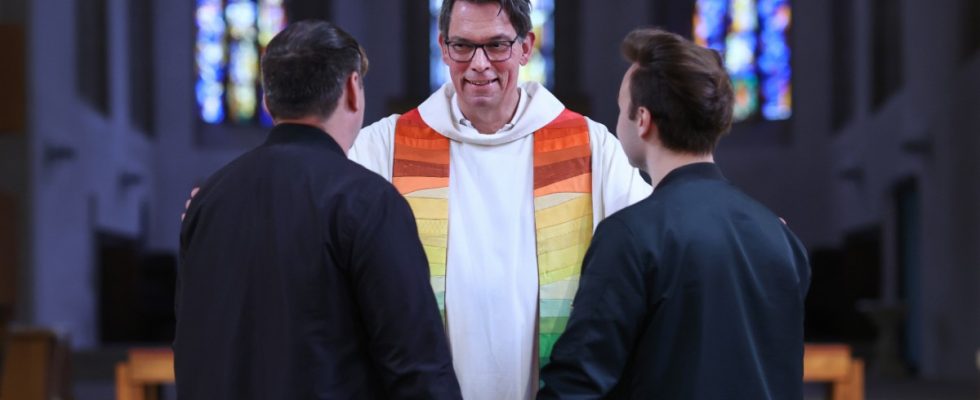The news came suddenly on Monday afternoon, but was well prepared for the press at Bolletino number 901, in five languages - including German. That made perfect sense, because German Catholics and their bishops have long been struggling with whether or not they should bless homosexual couples. Many German priests want this and are doing it, but so far with clear disapproval from the church leadership in Rome.
But now the highest authorities say: Yes, homosexual couples can now also be blessed in the Catholic Church. For this purpose, the concept of blessing is expanded into a somewhat more complicated interpretation. However, it is emphasized that confusion with a marriage must be ruled out. A clergyman is also not allowed to give the blessing during a church service.
All of this can be found in the Vatican religious authority’s new statement of principles entitled “Fiducia supplicans”, in German: The pleading trust. The statement bears the signature of the faith authority’s new prefect, Cardinal Victor Fernandez, and was expressly approved by Pope Francis. This declaration, it says in the introduction of the multi-page text in 45 paragraphs, should be “a gift to the faithful people of God, who adore the Lord with so many gestures of deep trust in his mercy and with this attitude always around the Mother Church asks the blessing.”
The Pope wants to avoid being “judges who only negate, reject and exclude”
In the Faith Authority text, Fernandez emphasizes that the Church has broadened and enriched its understanding of what a blessing is in light of Pope Francis’ pastoral ideals. Blessings are one of the most widespread and constantly evolving sacramentals. From a strictly liturgical perspective, the blessing requires that what is blessed really corresponds to the will of God, as expressed in the teaching of the Church.
However, it is important for the Pope “not to neglect the pastoral care that must permeate all our decisions and attitudes” and to avoid being “judges who only negate, reject and exclude.” In this sense, a more comprehensive understanding of the blessings has now been developed, so to speak, outside the strict liturgical framework, “in a realm of greater spontaneity and freedom.” After all, there are various occasions on which people spontaneously ask for a blessing, be it on pilgrimages, at pilgrimage sites or even on the street when they meet a priest.
As recently as 2021, it was announced that blessings for homosexual couples were not possible
With this evolved understanding of blessing, it is now possible to “bless couples in irregular situations and same-sex couples without officially convalidating their status or changing in any way the Church’s consistent teaching on marriage.” Beyond this interpretation, however, no further answers should now be expected about possible ways to standardize details or practical aspects regarding blessings of this kind, the statement makes clear.
As recently as February 2021, the same Vatican religious authority announced that blessings for homosexual couples were not possible in the Catholic Church. According to current Catholic teaching, it is not a sin to have homosexual feelings. However, same-sex intimate acts are “intrinsically not okay”. The expression of sexuality is reserved for marriage, which can only be concluded between a man and a woman.
A pastor from Mettmann near Düsseldorf was recently warned for blessing celebrations
This explanation was often met with incomprehension, especially in Germany. The approval of blessing ceremonies for same-sex couples was a main demand for the German Synodal Path reform process and was then decided by the Synodal Assembly in March 2023. Representatives of the Vatican were surprised by this, but the Vatican clearly did not want to escalate the issue any further. Insiders spoke of a “gray area” in which German priests would have to find their way.
In particular, the Archbishop of Munich, Cardinal Reinhard Marx, tried to help the priests. Marx repeatedly expressed his incomprehension of the strict interpretation from Rome. It always depends on the specific situation, he said publicly several times. He himself could not imagine denying it to homosexual couples who would ask for his blessing.
In the fall, the case of a priest from Mettmann near Düsseldorf caused a stir who had repeatedly held a blessing ceremony for lovers – including homosexual couples – and was warned for this by the Archdiocese of Cologne under Cardinal Woelki. Woelki had argued that as long as there was no clear language regulation from Rome, priests would not be allowed to give the blessing. This language regulation is now in place. She is welcomed by the German Catholic Bishops’ Conference.

